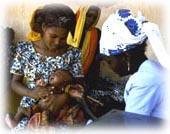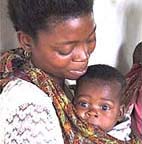| | More
About GAVI Who We Are
GAVI and the Vaccine Fund (August 2002)
(Powerpoint - 436kb) |
| 
First step forward: immunization at a clinic for mothers and
babies in Niger |
- GAVI
introductory video

| | (You will need RealPlayer installed to
view this video. If you haven't already, you can get it for free by clicking here) |
|
| |  |
Background
For more than a century, scientists and public health leaders
have known that preventing infectious diseases is the most efficient form of health
intervention. During the twentieth century, medical research led to the development
of vaccines that prevent a number of crippling, often fatal, childhood diseases.
However, as a new century begins, the world falls short of realizing the full
benefit of childhood immunization. The Global Alliance for Vaccines and Immunization
(GAVI) was formed in 1999 with the mission of ensuring that every child in the
world will be protected against vaccine-preventable diseases. GAVI exists
as a mechanism for coordinating and revitalizing immunization programs at international,
regional and national levels. At present, immunization
programs appear to save up to 3 million lives annually worldwide. However, almost
3 million people still die annually from diseases that could be prevented with
currently available vaccines. Children in the
poorest countries are the least protected, and the gap between the vaccines readily
available to them and those available to children in the industrialized world
is growing. GAVI is committed to closing this gap through a global network of
international development organizations, multilateral development banks, philanthropic
organizations, private sector leaders and other parties focused on re-energizing
the world’s commitment to vaccines and immunization. By
significantly expanding the reach and effectiveness of immunization programs country
by country, the GAVI partners hope to help decrease the burden of disease globally.
GAVI reaffirms that immunization is a cornerstone for health, a key component
of the broader framework of economic development and poverty reduction, and an
essential step to protecting children’s health and allowing each child to
reach his or her greatest physical and intellectual potential. [Return
To Top]
GAVI is a worldwide partnership Since immunization
is a global issue, it requires a global solution. GAVI represents an historic
alliance of public and private sector partners assembled into a worldwide network.
These partners are: the Bill and Melinda Gates
Children’s Vaccine Program, The World Health
Organization (WHO) , The United Nations Children’s
Fund (UNICEF), The World Bank Group,
Foundations, Developing
country governments, Nongovernmental Organizations
(NGOs), Government – Industrialized Countries,
Research and technical health institutions,
Vaccine Industry – Industrialized Country,
Research and technical health institutions,
Vaccine Industry – Developing Country.
GAVI’s Board of Directors consists of top officials from its members and
is currently chaired by Ms. Carol Bellamy, Executive
Director of UNICEF. Dr. Gro Brundtland, WHO
Director General, was the former chair. [Return
To Top]
Objectives
To fulfill its mission of protecting children of all
nations and of all socioeconomic levels against vaccine-preventable diseases,
GAVI has established six strategic objectives: - Improve
access to sustainable immunization services
- Expand
the use of all existing, safe and cost-effective vaccines where they address a
public health problem
- Support the
national and international accelerated disease control targets for vaccine-preventable
diseases
- Accelerate the development
and introduction of new vaccines and technologies
- Accelerate
R&D efforts for vaccines needed primarily in developing countries
- Make immunization coverage
a centerpiece in international development efforts
[Return To Top]
GAVI
Milestones
- By 2005, 80% of developing countries
will have routine immunization coverage of at least 80% in all districts.
- By 2002, 80% of all countries with adequate delivery systems
will have introduced hepatitis B vaccine. By 2007, all countries.
- By 2005, 50% of poorest countries with high disease burdens and adequate delivery systems will have introduced Hib vaccine.
- By 2005, the world will be certified polio-free.
- By 2005, the vaccine efficacy and burden of disease will be known for all regions for rotavirus and pneumococcal vaccine, and mechanisms identified to make the vaccines available to the poorest countries.
[Return To Top]
How GAVI will accomplish its goals
The
Alliance will work towards its objectives through the following mechanisms:
- Improving donor collaboration to ensure effective
use of immunization funding and developing sustainable financing instruments for
vaccine procurement
- Working with individual
countries to strengthen national immunization services through enhanced coordination
among governments and development partners
- Working
with global vaccine industry partners to continue to provide the highest quality
vaccines at the lowest appropriate pricing and exploring a competitive negotiation
mechanism to help bring new vaccines to the poorest populations at the earliest
possible time
- Seeking to achieve
a balance between three vaccine procurement objectives:
-
prices that are affordable to governments;
-
adequate investment in capacity to supply global needs;
-
and private investment in research and development of high-priority vaccines for
developing countries.
- The
newly created Vaccine Fund is one of the financial
tools available for GAVI to purchase under-utilized and new vaccines and to provide
resources to strengthen immunization infrastructure. It will also support research
for developing new vaccines – against diseases such as malaria, AIDS or tuberculosis
– needed primarily in the developing world. The Bill and Melinda Gates Foundation
generously pledged $750 million (US$150 million per year for five years) to establish
the Vaccine Fund. Further support has now been voiced by the United States Government.
On January 10, 2000, at the opening meeting of the United Nations Security Council,
Vice President Al Gore announced plans to ask Congress for a new $50-million investment
in the Vaccine Fund. (For archived news reports of this announcement visit www.vaccines.com).
[Return
To Top] To find out more about GAVI and how
to join this worldwide effort, please contact: Lisa
Jacobs
GAVI Secretariat
c/o UNICEF
Palais des Nations,
1211 Geneva
10
Switzerland
Tel: 41.22.909.50.19
Fax: 41.22.909.59.31
E-mail:
Gavi@unicef.org
|
